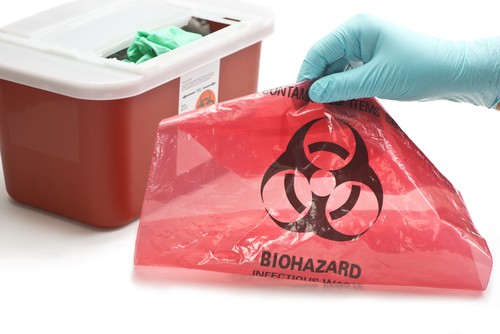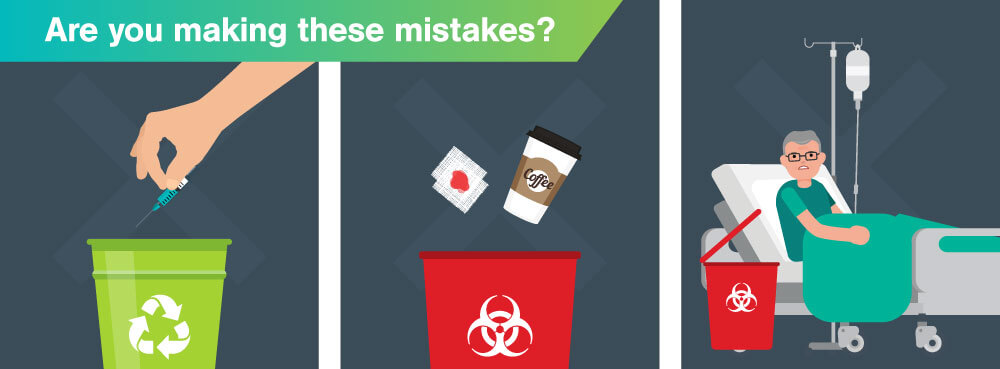Eco-Friendly Solutions for Medical Waste Removal: Prioritizing Safety And Security and Compliance
Wiki Article
Reliable Approaches of Medical Garbage Disposal
Reliable methods of medical waste disposal are vital in keeping public health and environmental safety. Clinical waste, consisting of sharps, pathological waste, and pharmaceutical waste, should be managed and gotten rid of appropriately to stop the spread of infections and shield the atmosphere. This calls for adherence to strict laws and the application of expert waste administration techniques.Proper segregation of medical waste, safe and secure and secure storage space, reliable treatment and sanitation methods, and environmentally-friendly disposal alternatives are vital elements of an efficient clinical waste disposal system. Expert waste monitoring solutions play a vital duty in making sure compliance with policies and reducing the risks connected with incorrect disposal. By utilizing these techniques, medical care facilities can add to a much safer and cleaner environment while safeguarding the health of the community.
Correct Segregation of Medical Waste
Proper segregation of clinical waste is necessary for guaranteeing the secure and effective disposal of these potentially harmful materials. Clinical waste refers to any type of waste produced throughout healthcare tasks, such as hospitals, centers, laboratories, and study facilities. It includes a wide variety of products, such as utilized needles, syringes, contaminated dressings, ended or unused medicines, and biological materials.By setting apart medical waste, healthcare facilities can reduce the risk of infections, injuries, and environmental contamination. The process involves classifying waste into various types, such as sharps, contagious waste, pharmaceutical waste, and non-hazardous waste. Each type calls for certain handling, product packaging, and disposal methods to protect against exposure to medical care employees, waste management personnel, and the public.
To make certain proper partition, healthcare centers should develop clear standards and supply sufficient training to personnel. This includes enlightening workers on the various waste classifications, correct packaging techniques, and the usage of ideal containers - WasteX Medical Waste Disposal. Furthermore, clear signage and color-coding systems can be applied to promote the recognition and segregation of various waste kinds
Safe and Secure Storage of Medical Waste
Safe and safe and secure storage space of clinical waste is essential for keeping the integrity and containment of potentially unsafe products. Correct storage space not just shields health care workers and the public from direct exposure to harmful materials however additionally protects against environmental contamination.To make sure secure storage space, medical facilities ought to comply with particular guidelines. Waste should be stored in puncture-resistant and leak-proof containers that are identified suitably. These containers need to be securely sealed to stop any kind of leak or spills. Additionally, the storage space location must be inaccessible and secure to unapproved workers, lessening the risk of unintentional direct exposure.
Appropriate partition of clinical waste is also essential for safe storage. Different kinds of waste, such as sharps, infectious materials, and pharmaceutical waste, must be separated to avoid cross-contamination. This partition can be attained with making use of color-coded containers or containers.
Normal surveillance and examination of the storage location are crucial to identify any kind of potential dangers or violations. This consists of monitoring for indications of damage or degeneration in the containers, making sure appropriate ventilation, and keeping an eye on temperature level and moisture levels.
Reliable Treatment and Disinfection Techniques

One generally used therapy technique is autoclaving, which entails subjecting the waste to high-pressure heavy steam at temperature levels over 121 levels Celsius. This procedure successfully eliminates microbes and destroys infectious agents, rendering the waste risk-free for additional disposal. An additional approach is incineration, which includes shedding the waste at high temperatures. Incineration not only eliminates microbes however likewise decreases the waste volume via burning.
Chemical disinfection is another reliable technique for treating medical waste. This method includes using anti-bacterials such as chlorine substances, phenolic compounds, or hydrogen peroxide to eliminate or inactivate pathogens (WasteX Medical Waste Disposal). Chemical sanitation is commonly utilized for fluid waste, such as lab samples or physical liquids
Recently, different treatment approaches such as microwave disinfection, irradiation, and organic therapy have additionally acquired focus. These methods supply benefits such as decreased environmental impact and energy intake compared to standard methods.
Environmentally-friendly Disposal Options
In the realm of clinical waste disposal, considering environmentally-friendly choices is essential. Medical care facilities create a significant amount of waste, consisting of infectious products, pharmaceuticals, and chemicals, which can present serious dangers to human wellness and the atmosphere otherwise handled effectively. There are numerous environmentally-friendly disposal options offered that can aid mitigate these dangers.
Recycling medical waste includes setting apart and refining specific products for reuse or repurposing. In addition, some medical care facilities have actually implemented recycling programs for certain medical devices or equipment, further reducing waste generation.
Another environmentally-friendly disposal choice is waste-to-energy conversion. This technique includes converting medical waste into energy via procedures like incineration or anaerobic digestion. medical waste disposal. Incineration, when done effectively with advanced technologies, can generate power while lessening unsafe exhausts. Anaerobic food digestion, on the various other hand, breaks down organic waste in the absence of oxygen, generating biogas that can be made use of for electrical energy or warm generation.

Advantages of Professional Waste Monitoring Services
One considerable advantage of specialist waste management solutions is the boosted performance in disposing and managing of clinical waste. By making use of professional waste administration solutions, health care centers can make certain that all clinical waste is taken care of and disposed of properly, minimizing the threat of contamination and the spread of diseases.Professional waste management services employ skilled and qualified workers who are experienced regarding the policies and guidelines for medical waste disposal. They have access to customized tools and tools that enable them to handle different kinds of clinical waste securely and effectively. These services additionally have reputable treatments and methods in position to make sure that waste is segregated, packaged, carried, and disposed of in compliance with neighborhood, state, and government guidelines.
Additionally, expert waste management solutions can give health care facilities with thorough waste monitoring services. They can provide solutions such as waste collection, transport, disposal, and therapy, customized to the particular needs and needs of the facility. This removes the problem of handling waste inside, enabling healthcare team to concentrate on giving high quality person care.
Conclusion
To conclude, effective approaches of medical garbage disposal involve appropriate segregation, risk-free storage, therapy and disinfection, and environmentally-friendly disposal options (WasteX Medical Waste Disposal). These approaches ensure the risk-free handling and management of medical waste, protecting against the spread of infections and shielding the environment. Expert waste monitoring services play a vital role in executing these techniques and making certain compliance with policies. By adhering to these practices, health care facilities can add to a much safer and much healthier environment for both individuals and the neighborhood.Clinical waste, consisting of sharps, pathological waste, and pharmaceutical waste, should be taken care of and disposed of effectively to stop the spread of infections and safeguard the environment.Appropriate partition of clinical waste, safe and secure and risk-free storage space, reliable therapy and disinfection techniques, and environmentally-friendly disposal alternatives are key components of a reliable clinical waste disposal system. The procedure includes categorizing waste right into various types, such as sharps, transmittable waste, pharmaceutical waste, and non-hazardous waste. By utilizing professional waste management solutions, healthcare centers can ensure that all clinical waste is managed and disposed of appropriately, lessening the danger of contamination and the spread of diseases.
Specialist waste administration services use skilled and qualified personnel that are experienced about the laws and standards for medical waste disposal.
Report this wiki page